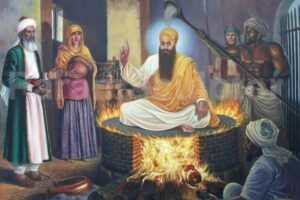 Guru Arjan Dev Ji, the fifth Guru of the Sikhs, was born on April 15, 1563, in Goindwal Sahib, Punjab. He was the youngest son of Guru Ram Das Ji and Mata Bhani Ji, the daughter of Guru Amar Das Ji, making him the grandson of the third Guru. From his early years, Arjan Dev displayed a deeply spiritual and gentle nature. He was known for his humility, devotion, and sharp intellect. His calm demeanor and dedication to seva (selfless service) earned him the love and trust of his father, who carefully prepared him for Guruship. In 1581, at the age of 18, Guru Arjan Dev Ji was appointed as the fifth Guru by his father, Guru Ram Das Ji. His succession was not without internal family conflict — his elder brother Prithi Chand opposed the decision and later worked actively against Guru Arjan, but the Guru remained peaceful and focused on his spiritual mission. Guru Arjan Dev Ji’s Guruship marked a turning point in Sikh history, as he expanded the Sikh community both spiritually and institutionally, while also laying down the foundation of Sikh scripture and central worship.
Guru Arjan Dev Ji, the fifth Guru of the Sikhs, was born on April 15, 1563, in Goindwal Sahib, Punjab. He was the youngest son of Guru Ram Das Ji and Mata Bhani Ji, the daughter of Guru Amar Das Ji, making him the grandson of the third Guru. From his early years, Arjan Dev displayed a deeply spiritual and gentle nature. He was known for his humility, devotion, and sharp intellect. His calm demeanor and dedication to seva (selfless service) earned him the love and trust of his father, who carefully prepared him for Guruship. In 1581, at the age of 18, Guru Arjan Dev Ji was appointed as the fifth Guru by his father, Guru Ram Das Ji. His succession was not without internal family conflict — his elder brother Prithi Chand opposed the decision and later worked actively against Guru Arjan, but the Guru remained peaceful and focused on his spiritual mission. Guru Arjan Dev Ji’s Guruship marked a turning point in Sikh history, as he expanded the Sikh community both spiritually and institutionally, while also laying down the foundation of Sikh scripture and central worship.
One of Guru Arjan Dev Ji’s greatest contributions was the compilation of the Adi Granth, the sacred scripture that would later become the Guru Granth Sahib, the eternal Guru of the Sikhs. He collected hymns of all the previous Gurus, along with those of various saints (Bhagats) from different religious backgrounds — including Hindu and Muslim — such as Bhagat Kabir, Bhagat Namdev, and Sheikh Farid. This act reinforced the inclusive and universal message of Sikhism. He completed the Adi Granth in 1604 and installed it in the Harmandir Sahib (Golden Temple), which he also oversaw the construction of in Amritsar.
The Harmandir Sahib, designed by Guru Arjan Dev Ji, was built with four doors in all directions to symbolize openness and acceptance of all people, regardless of caste, religion, or background. He invited Hazrat Mian Mir, a revered Muslim Sufi saint, to lay the foundation stone of the temple — a profound gesture of interfaith unity. The temple was built at a lower level than the surrounding land to reflect humility, and the sacred Amrit Sarovar (Pool of Nectar) around it provided spiritual solace and healing.
Guru Arjan Dev Ji also encouraged economic growth and community building. He guided Sikhs to live by honest labor (Kirat Karo), share with others (Vand Chakko), and stay spiritually connected through Naam Simran. He collected voluntary offerings from Sikhs and used them for building community projects, gurudwaras, and supporting the needy. Under his leadership, Sikhism emerged as a distinct, thriving spiritual path with its own scripture, temple, and growing community.
However, as Sikhism gained popularity and influence, it also attracted the attention and suspicion of the Mughal rulers. Emperor Jahangir, in particular, felt threatened by the growing power of the Sikh community and by Guru Arjan Dev Ji’s association with Prince Khusrau, Jahangir’s rebellious son. The Mughal authorities accused Guru Arjan of supporting Khusrau and imposed a heavy fine. When Guru Arjan refused to alter the Sikh scriptures or bow to the emperor’s will, he was arrested and tortured.
Guru Arjan Dev Ji was subjected to horrific torture in Lahore in 1606. He was made to sit on a burning hot plate, and hot sand was poured over his body. Despite the unbearable pain, Guru Arjan remained calm and composed, immersed in the remembrance of God. His last words were reportedly:
“Tera Kiya Meetha Lage, Naam Padarath Nanak Mange” —
“Sweet is Your Will, O Lord; Nanak seeks only the gift of Your Name.”
On June 16, 1606, Guru Arjan Dev Ji attained martyrdom, becoming the first Sikh martyr. His martyrdom was a turning point in Sikh history. It marked the beginning of the community’s resistance to oppression and inspired future Gurus to prepare Sikhs not only for spiritual strength but also for self-defense and justice. Before his death, Guru Arjan Dev Ji passed on the Guruship to his son, Guru Hargobind Sahib Ji, with instructions to start a new chapter in Sikh history — one of Miri and Piri, balancing spiritual and temporal authority.


Leave a Reply